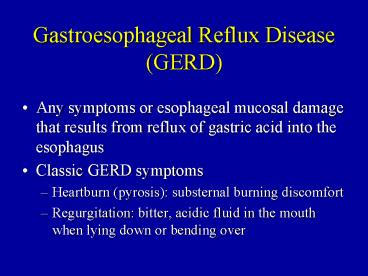Gastroesophageal Reflux Disease GERD - PowerPoint PPT Presentation
1 / 37
Title:
Gastroesophageal Reflux Disease GERD
Description:
... mucosal damage that results from reflux of gastric acid into the esophagus ... High Prevalence of Gastroesophageal Reflux Symptoms ... – PowerPoint PPT presentation
Number of Views:1051
Avg rating:3.0/5.0
Title: Gastroesophageal Reflux Disease GERD
1
Gastroesophageal Reflux Disease (GERD)
- Any symptoms or esophageal mucosal damage that
results from reflux of gastric acid into the
esophagus - Classic GERD symptoms
- Heartburn (pyrosis) substernal burning
discomfort - Regurgitation bitter, acidic fluid in the mouth
when lying down or bending over
2
High Prevalence of Gastroesophageal Reflux
Symptoms
3
(No Transcript)
4
Important Reasons to Diagnose and Treat GERD
- Negative impact on health-related quality of
life1 - Risk factor for esophageal adenocarcinoma2
- Revicki et al. Am J Med 1998104252.
- Lagergren et al. N Engl J Med 1999340825.
5
(No Transcript)
6
(No Transcript)
7
Clinical Presentations of GERD
- Classic GERD
- Extraesophageal/Atypical GERD
- Complicated GERD
8
(No Transcript)
9
Extraesophageal Manifestations of GERD
- Pulmonary
- Asthma
- Aspiration pneumonia
- Chronic bronchitis
- Pulmonary fibrosis
- Other
- Chest pain
- Dental erosion
- ENT
- Hoarseness
- Laryngitis
- Pharyngitis
- Chronic cough
- Globus sensation
- Dysphonia
- Sinusitis
- Subglottic stenosis
- Laryngeal cancer
10
Potential Oral and Laryngopharyngeal Signs
Associated with GERD
- Edema and hyperemia of larynx
- Vocal cord erythema, polyps, granulomas, ulcers
- Hyperemia and lymphoid hyperplasia of posterior
pharynx - Interarytenyoid changes
- Dental erosion
- Subglottic stenosis
- Laryngeal cancer
Vaezi MF, Hicks DM, Abelson TI, Richter JE. Clin
Gastro Hep 20031333-344.
11
Pathophysiology of Extraesophageal GERD
12
Symptoms of Complicated GERD
- Dysphagia
- Difficulty swallowing food sticks or hangs up
- Odynophagia
- Retrosternal pain with swallowing
- Bleeding
13
(No Transcript)
14
When to Perform Diagnostic Tests
- Uncertain diagnosis
- Atypical symptoms
- Symptoms associated with complications
- Inadequate response to therapy
- Recurrent symptoms
- Prior to anti-reflux surgery
15
Diagnostic Tests for GERD
- Barium swallow
- Endoscopy
- Ambulatory pH monitoring
- Esophageal manometry
16
Barium Swallow
- Useful first diagnostic test for patients with
dysphagia - Stricture (location, length)
- Mass (location, length)
- Birds beak
- Hiatal hernia (size, type)
- Limitations
- Detailed mucosal exam for erosive esophagitis,
Barretts esophagus
17
Endoscopy
- Indications for endoscopy
- Alarm symptoms
- Empiric therapy failure
- Preoperative evaluation
- Detection of Barretts esophagus
18
Ambulatory 24 hr. pH Monitoring
- Physiologic study
- Quantify reflux in proximal/distal esophagus
- time pH lt 4
- DeMeester score
- Symptom correlation
19
Ambulatory 24 hr. pH Monitoring
Normal
GERD
20
Wireless, Catheter-Free Esophageal pH Monitoring
Potential Advantages
- Improved patient comfort and acceptance
- Continued normal work, activities and diet study
- Longer reporting periods possible (48 hours)
- Maintain constant probe position relative to SCJ
21
Esophageal Manometry
Limited role in GERD
- Assess LES pressure, location and relaxation
- Assist placement of 24 hr. pH catheter
- Assess peristalsis
- Prior to antireflux surgery
22
Treatment Goals for GERD
- Eliminate symptoms
- Heal esophagitis
- Manage or prevent complications
- Maintain remission
23
Lifestyle Modifications are Cornerstone of GERD
Therapy
- Elevate head of bed 4-6 inches
- Avoid eating within 2-3 hours of bedtime
- Lose weight if overweight
- Stop smoking
- Modify diet
- Eat more frequent but smaller meals
- Avoid fatty/fried food, peppermint, chocolate,
alcohol, carbonated beverages, coffee and tea - OTC medications prn
24
Acid Suppression Therapy for GERD
- H2-Receptor Antagonists
- (H2RAs)
- Cimetidine (Tagamet)
- Ranitidine (Zantac)
- Famotidine (Pepcid)
- Nizatidine (Axid)
- Proton Pump Inhibitors
- (PPIs)
- Omeprazole (Prilosec)
- Lansoprazole (Prevacid)
- Rabeprazole (Aciphex)
- Pantoprazole (Protonix)
- Esomeprazole (Nexium )
25
Effectiveness of Medical Therapies for GERD
Treatment Response Lifestyle
modifications/antacids 20 H2-receptor
antagonists 50 Single-dose PPI 80
Increased-dose PPI up to 100
26
Treatment Modifications for Persistent
Symptoms
- Improve compliance
- Optimize pharmacokinetics
- Adjust timing of medication to 15 30 minutes
before meals (as opposed to bedtime) - Allows for high blood level to interact with
parietal cell proton pump activated by the meal - Consider switching to a different PPI
27
GERD is a Chronic Relapsing Condition
- Esophagitis relapses quickly after cessation of
therapy - gt 50 relapse within 2 months
- gt 80 relapse within 6 months
- Effective maintenance therapy is imperative
28
Complications of GERD
- Erosive/ulcerative esophagitis
- Esophageal (peptic) stricture
- Barretts esophagus
- Adenocarcinoma
29
Erosive Esophagitis
30
Peptic Stricture
Barium Swallow
Endoscopy
31
Esophageal Stricture Dilating Devices
32
TTS Balloon Dilation of a Peptic Stricture
33
Barretts Esophagus
34
Esophageal Cancer
Barium Swallow
Endoscopy
35
(No Transcript)
36
When to Discuss Anti-Reflux Surgery with Patients
- Intractable GERD rare
- Difficult to manage strictures
- Severe bleeding from esophagitis
- Non-healing ulcers
- GERD requiring long-term PPI-BID in a healthy
young patient - Persistent regurgitation/aspiration symptoms
- Not Barretts esophagus alone
37
Endoscopic GERD Therapy
- Endoscopic antireflux therapies
- Radiofrequency energy delivered to the LES
- Stretta procedure
- Suture ligation of the cardia
- Endoscopic plication
- Submucosal implantation of inert material in the
region of the lower esophageal sphincter - Enteryx































